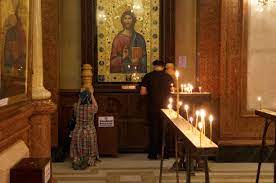I do not cease to give thanks for you, remembering you in my prayers, that the God of our Lord Jesus Christ, the Father of glory, may give you a spirit of wisdom and of revelation in the knowledge of Him, having the eyes of your hearts enlightened, that you may know what is the hope to which He has called you, what are the riches of His glorious inheritance in the saints.
Ephesians 1:16-18
Shine in our hearts (2 Corinthians 4:6), O Master Who loves mankind, the pure light of your Divine Knowledge, and open the eyes of our mind that we may comprehend the proclamations of Your Gospels (Ephesians 1:18). Instill in us also reverence for Your blessed commandments so that, having trampled down all carnal desires, (2 Peter 2:11) we may lead a spiritual life, both thinking and doing all those things that are pleasing to You. For You, Christ our God, are the illumination of our souls and bodies, and to You we offer glory, together with Your Father, Who is without beginning, and Your all-holy, good and life-creating Spirit, now and forever and to the ages of ages. Amen.
(Adapted from the Translation by Narthex Press of the 12 Orthros Prayers)
There are twelve prayers that a priest offers during the Orthros (Matins) service which are never heard aloud. Each has a theme that sets the tone for the day. I don’t think there is anything wrong with me sharing these prayers or for anyone to pray them. I enjoy sharing thoughts about faith and about Christ each day, as well as giving you occasional insights into the priesthood. I hope the reflections on these prayers will give all of us something to think and add to our spiritual journeys. I’m changing the format of the Prayer Team for these reflections—both the scripture verse and the prayer will precede the reflection for this unit.
There are four things that every Christian needs to do. They need to understand what it means to be a Christian. They need faith to believe in the tenets of Christianity. They need to practice the tenets of Christianity. And then need to belong to a church community.
Let’s unpack these for a minute. However, let’s go in reverse. Most people reading this message are Orthodox Christians. Orthodoxy calls on us to practice our Christianity in a certain way, with things like worship and the Eucharist being central to our practice. And there are other Traditions like fasting, the liturgical cycle, confession, etc.
However, all of the Orthodox practice doesn’t do much good if we are not doing the TWO things that Christ commanded us to do—to love God and to love one another. The church gives us some direction and structure for how to practice but the overall practice of Christianity centers around love for God (obedience to His commandments) and service to our neighbors.
Before we can follow these two great commandments, we need faith in the message. If one doesn’t believe in God, then it is hard to convince them that we need to love God and love our neighbor. Well, it may not be hard to convince someone to love a neighbor—we all get along better when we do that. However, if we love our neighbor only so we can get along, then that is self-serving and not serving God.
And before we can believe in the message, we have to understand the message. And that’s where Scripture comes in. Scripture is the message. Sermons and classes at a church help us comprehend the message. And the ninth of these twelve beautiful prayers focuses on understanding the Scripture. Because Scripture reading should be part of our daily lives. There isn’t a church sermon or a catechism class every day. But Scripture reading is something we should be doing every day. And this prayer is an excellent prayer to offer before we read Scripture. It asks God to help us comprehend what we are reading. Because comprehension is an important building block of faith. Faith leads us to practice. Orthodoxy (or belonging to a church) is supposed to bolster that practice. However, if there is no comprehension, the other steps do not necessarily follow.
Not every passage of Scripture is going to touch our heart-strings. Some passages are very hard to understand. Some passages are repetitive. Some, we might even say, are a little boring. This is why it is necessary to pray for comprehension and also seek out other sources—footnotes in a Bible translation, podcasts about Scripture, sermons, Bible studies, etc. The best place to start, however, is prayer.
If you are not used to reading the Bible, don’t start with Leviticus or Chronicles. Start with the four Gospels, and read them several times, so that you can understand the message of Christ. Then continue to the Acts of the Apostles, which continues the narrative of the Gospels. Then read the Epistles, because these are letters to the early churches about Christian life, practice and faith, and they still apply to us today. Then go to the Old Testament, because the Old Testament is foundational to the New. You don’t have to read a lot of Scripture each day. A chapter, or even a few verses will be beneficial. We do, however, need to spend some time in God’s Word, because this is one of the ways God speaks to us, and Scripture serves as a foundation for faith, practice and everything else that it means to be a Christian.
Encouragement for today: Pray this prayer each time you read Scripture, and spend time each day reading Scripture.
